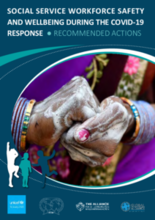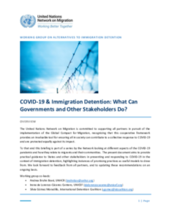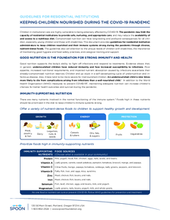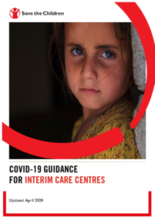This section includes resources on the response to the COVID-19 pandemic as it relates to child protection and children's care.
News on COVID-19 and Children's Care
Webinars and Events on COVID-19 Response
Displaying 431 - 440 of 756
The Alliance for Child Protection in Humanitarian Action and UNICEF facilitated this webinar to discuss the guidance in the Technical Note on COVID-19 and Children Deprived of their Liberty and some of the successes and challenges in protecting the rights of children in detention during the pandemic.
This document is intended to provide guidance on how to support the social service workforce and empower them to safely serve children, families, and communities during the COVID-19 pandemic.
These tip sheets from Save the Children provide recommendations for disability inclusion during COVID-19 across a range of thematic areas and topics, including education, cash transfers, health, and nutrition.
The present document aims to provide practical guidance to States and other stakeholders in preventing and responding to COVID-19 in the context of immigration detention, including the detention of unaccompanied and separated children, highlighting instances of promising practices as useful models to draw from.
UNICEF Innocenti is mobilizing a rapid research response in line with UNICEF’s global response to the COVID-19 crisis. This microsite features resources and research projects covering a rapid review of evidence, education analysis, and social and economic policies.
This document from the Spoon Foundation provides guidelines for residential institution administrators to keep children nourished and their immune systems strong during the pandemic through diverse, nutrient-dense foods.
This guidance is for Save the Children staff and partners already running Interim Care Centres (ICCs) during the Covid-19 pandemic.
The aim of this webinar was to elaborate on the Technical Note in support of child protection practitioners and government officials in their immediate response to the child protection concerns faced by children who are at risk of separation or in alternative care during COVID-19 pandemic.
This study investigated depressive and anxiety symptoms among students in Hubei province, China, which can help optimize interventions on the mental health of children for stakeholders in all countries affected by COVID-19.
This blog post by Zahrah Nesbitt-Ahmed and Ramya Subrahmanian of the UNICEF Office of Research - Innocenti calls attention to the risks faced by women and girls in light of the economic and social fallout of the COVID-19 pandemic and the impacts of the pandemic on women and girls' unpaid care work.




